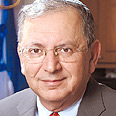
Prof. Moshe Kaveh
צילום: מיקי קורן
Bar Ilan president slams religious fear of academia
Prof. Moshe Kaveh was elected this week for a sixth term as president of Bar Ilan University, Israel's only religious university. In an interview with Ynet he explains why yeshiva graduates should go to the academia and why seculars must study Judaism
Professor Moshe Kaveh, 66, is as energetic and vibrant as a young ambitious doctoral student who is just waiting for his big academic breakthrough. Kaveh was recently reelected for his sixth term as president of Bar Ilan University, the only religious university in Israel. How has he been able to maintain this position? Kaveh replies simply: "I consider it to be my life's mission."
What's the meaning of a religious university?
"It means to strive for academic excellence in every field, while at the same time providing elements related to the Jewish tradition, the appreciation of Jewish history, of our religion and heritage that have been handed down to us, of Jewish wisdom.
"We have the largest faculty in the world for Jewish studies, with close to 2,000 courses and 33,000 students in our university and affiliated colleges. We nowadays have more students than Rabbi Akiva's 24,000, and unlike them, who did not treat each other with respect, we have learned our lesson. Here, even if you are smart and excel in your studies you have respect for others."
According to Kaveh, about 60% of the students in bar Ilan come from a non-religious background, "but they accept and enjoy Jewish studies." He stresses that "we don't preach here. We are an open university that respects every Jew and every opinion."
Kaveh believes that Bar Ilan helps enrich "true Judaism," which he defines as "an embracing, rather than rejecting Judaism."
In some circles the academia is considered illegitimate, particularly when it comes to Judaism studies.
"I don't think studies can be dangerous. There are also different opinions in the Jewish heritage and they are all being heard, and I believe that the young generation has the ability to judge for themselves. Let's not forget that in the 16th century the Church waged a war against science and put Galileo in jail for voicing dangerous opinions… Maimonides' books have also been burned. And today we say that there was no greater scholar than him."
Kaveh states that "where there is fear there is degeneration, and therefore the flow of people to academia cannot be stopped. Yeshiva graduates are 'voting with their feet.' There are always the opinions of one rabbi or the other that disqualify the academia, and they are even being heard at conferences we hold here."
Can you think of extreme cases in which academia and religion can clash, even only in theory?
"It's unthinkable that a surgeon won't operate or a researcher won't conduct his study because of religious restrictions. Judaism is so rich, and whoever voices such opinions does so out of fear, not concrete logic. Maimonides was a great doctor and Rabbi Yehuda Halevy was a great poet, so it is unreasonable that a young man fresh out of yeshiva won't be able to study medicine or literature."
Kaveh is critical of the failure of religious Zionism to foster prominent political leaders. "I think this is our mission now and I call on our students to become involved in politics, because this is where all the important decisions are being made."
However, he himself does not consider a political career. "I've had some offers, but I tuned them down because I consider what I do today to be my life's mission, and I've also invested a large part of them in providing tools not only for the training of scientists and teachers, but also in order for us to be able to produce in the next decade the leadership of the people of Israel."










